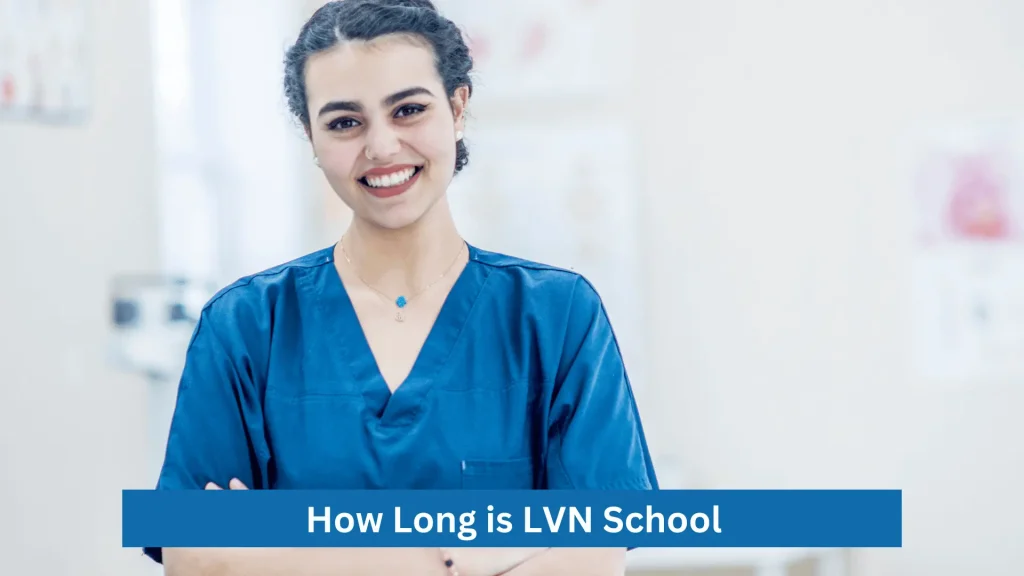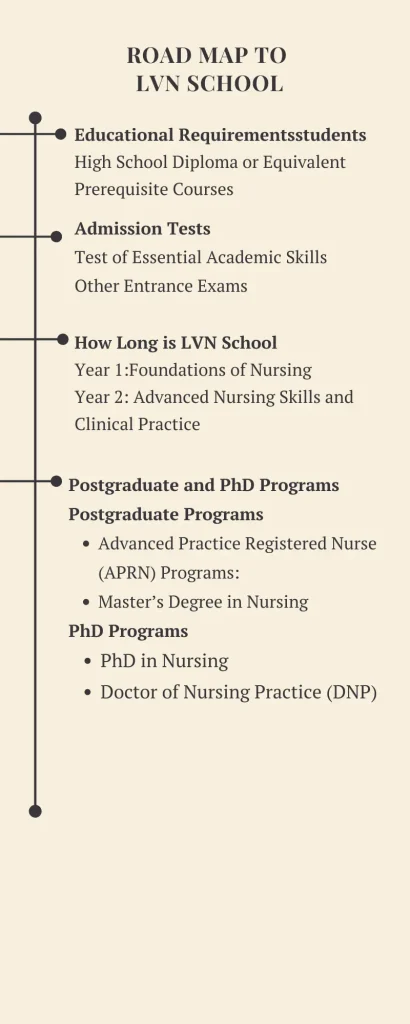The length of LVN school typically ranges from 12 to 18 months, depending on the program and whether it is full-time or part-time. Students will receive classroom instruction and hands-on clinical experience. Knowing “How Long is LVN School” helps aspiring nurses plan their education and career paths effectively.
What is LVN School
LVN (Licensed Vocational Nurse) school is a specialized training program that prepares students to become licensed vocational nurses. These programs combine classroom instruction with practical clinical experience, equipping students with the necessary skills and knowledge to provide basic patient care. Graduates must pass the NCLEX-PN exam to become licensed.

LVN school covers essential topics such as anatomy, physiology, pharmacology, and patient care techniques. Students also gain hands-on experience in clinical settings, working under the supervision of registered nurses and doctors. This training prepares them to assist with medical procedures, administer medications, and monitor patients’ health, making LVN school an important step towards a nursing career.
How Long is LVN School
Year 1: Foundations of Nursing
In the first year of an LVN program, students focus on foundational coursework. This includes subjects such as anatomy, physiology, pharmacology, and basic nursing skills. Students learn about patient care, medical terminology, and how to administer medications. They also begin their hands-on clinical experience, working in supervised healthcare settings to apply their classroom knowledge.
Year 2: Advanced Nursing Skills and Clinical Practice
The second year delves into more advanced nursing topics and skills. Students study specialized areas like pediatrics, geriatrics, and mental health nursing. Clinical practice becomes more intensive, with students spending more time in hospitals and clinics, gaining real-world experience. By the end of the second year, students are prepared to take the NCLEX-PN exam, the final step to becoming a licensed vocational nurse.

How to Enter LVN School
Educational Requirements for LVN School
High School Diploma or GED: Most LVN programs require applicants to have completed high school or obtained a GED.
Prerequisite Courses: Some programs may require specific high school courses such as biology, chemistry, and algebra.
Minimum GPA: A minimum GPA may be required, often around 2.5 or higher.
Entry Tests for LVN School
TEAS (Test of Essential Academic Skills): Many LVN programs require applicants to take the TEAS exam, which assesses basic academic skills in reading, math, science, and English.
Other Entrance Exams: Some schools may have their own entrance exams or additional assessments to evaluate candidates’ readiness for the program.
Application Process for LVN School
Application Form: Complete the school’s application form, which can usually be found on the institution’s website.
Transcripts: Submit official high school or college transcripts.
Letters of Recommendation: Some programs may require letters of recommendation from teachers, employers, or healthcare professionals.
Personal Statement: Write a personal statement or essay explaining your interest in becoming an LVN and your career goals.
Interview: Some schools may require an interview as part of the application process.
Financial Aids for LVN School
Federal Financial Aid: Apply for federal student aid by completing the Free Application for Federal Student Aid (FAFSA). This can provide grants, loans, and work-study opportunities.
Scholarships: Many institutions offer scholarships based on academic performance, financial need, or other criteria. Check with the school for available scholarships.
Grants: State and federal grants, such as the Pell Grant, may be available to eligible students.
Private Loans: Students can also explore private loans from banks or other financial institutions.
Work-Study Programs: Some schools offer work-study programs that allow students to work part-time while studying to help cover educational expenses.
Post Graduate and PhD Programs for LVN School
1. Postgraduate Programs
LVN-to-RN Bridge Programs: These programs are designed for LVNs who want to advance their careers by becoming Registered Nurses (RNs). They typically build on the knowledge and experience gained in LVN programs and include additional coursework in advanced nursing practices, leadership, and management.
Advanced Practice Registered Nurse (APRN) Programs: For those interested in specializing further, APRN programs offer advanced training in areas such as nurse practitioner, clinical nurse specialist, nurse anesthetist, or nurse midwife roles. These programs usually require a Master’s or Doctoral degree.
Master’s Degree in Nursing: This degree focuses on advanced clinical skills, leadership, and specialization in areas such as family practice, pediatrics, or gerontology. It typically requires a Bachelor’s degree in Nursing, but some programs may accept LVNs with additional experience or education.
2. PhD Programs
PhD in Nursing: A PhD program in nursing is research-focused and designed for those interested in contributing to the field through research, education, and policy development. It usually requires a Master’s degree in Nursing or a related field and involves coursework in advanced research methods, theory, and practice.
Doctor of Nursing Practice (DNP): The DNP is a clinical doctorate designed for those who want to apply research to practice and focus on leadership roles in advanced clinical settings. It involves advanced clinical training, evidence-based practice, and leadership.
Top 10 LVN Schools
1.Chamberlain University
Offers comprehensive LVN programs with a focus on both theory and clinical practice. Known for its strong support services and modern facilities.
2.Stanbridge University
Provides a well-rounded LVN program with a high NCLEX-PN pass rate. Features hands-on training and experienced faculty.
3.American Career College
Known for its robust LVN program with excellent clinical rotation opportunities and a supportive learning environment.
4.Southern California Health Institute (SOCHi)
Offers a dynamic LVN program that emphasizes practical skills and real-world experience, with a focus on patient care.
5.West Coast University
Provides an accelerated LVN program with a strong emphasis on clinical skills and career preparation.
6.Carrington College
Offers an LVN program with a focus on personalized instruction and hands-on training, preparing students for the NCLEX-PN exam.
7.GateWay Community College
Features a respected LVN program with a comprehensive curriculum and extensive clinical practice opportunities.
8.Kaplan College
Provides a well-regarded LVN program with a focus on practical skills and a strong support system for students.
9.Borough of Manhattan Community College
Known for its quality LVN program that includes rigorous training and a strong emphasis on clinical experience.
10.Pima Medical Institute
Offers an LVN program with a focus on practical training and a high success rate in NCLEX-PN exams.
These schools are recognized for their strong nursing programs, effective preparation for licensure exams, and commitment to student success.
Top 10 LVN Schools
Here are some of the top LVN (Licensed Vocational Nurse) schools known for their comprehensive programs, strong faculty, and excellent student outcomes:

Chamberlain University
Offers a well-regarded LVN program with a focus on both clinical and theoretical education. Known for its supportive learning environment and extensive resources.
West Coast University
Provides an accelerated LVN program with strong clinical training and modern facilities. The program emphasizes practical experience and career readiness.
Stanbridge University
Features a robust LVN program with a high NCLEX-PN pass rate. The curriculum includes hands-on training and a strong clinical component.
Southern California Health Institute (SOCHi)
Known for its dynamic LVN program that combines theoretical knowledge with practical skills. Emphasis is placed on real-world patient care experience.
American Career College
Offers an LVN program with comprehensive coursework and clinical rotations. Known for its supportive faculty and career services.
Carrington College
Provides a detailed LVN program with a focus on clinical practice and exam preparation. The college offers personalized instruction and a high pass rate.
Pima Medical Institute
Offers an LVN program with strong practical training and clinical experience. Known for its emphasis on student success and NCLEX-PN exam preparation.
Borough of Manhattan Community College (BMCC)
Features a respected LVN program with rigorous training and extensive clinical practice opportunities. Known for its diverse student body and supportive faculty.
GateWay Community College
Provides a comprehensive LVN program with a focus on practical skills and hands-on experience. Known for its strong academic support and clinical placements.
Kaplan College
Offers a well-regarded LVN program with personalized instruction and effective preparation for the NCLEX-PN exam. Known for its supportive learning environment.
These schools are recognized for their quality nursing programs, effective preparation for licensure exams, and strong student support services.
Factors Affecting the Length of LVN School
Program Type
Full-Time vs. Part-Time: Full-time programs typically take around 12 to 18 months to complete, while part-time programs may extend to 24 months or longer due to reduced weekly hours.
Curriculum Structure
Course Load: Programs with a more intensive curriculum may have a shorter duration, while those with additional electives or specializations may take longer.
Clinical Hours: Programs requiring more extensive clinical practice may extend the overall length.
Accreditation and Requirements
Accreditation Standards: Accredited programs often adhere to specific standards that can affect the length of the program.
State Requirements: Different states may have varying requirements for clinical hours and coursework, influencing the duration of the program.
Student Experience and Background
Prerequisites: Students with prior healthcare experience or relevant coursework may be able to complete the program more quickly.
Transfer Credits: Students transferring credits from previous education may shorten the length of their LVN program.
Program Delivery Format
On-Campus vs. Online: Online or hybrid programs may offer flexible scheduling, which can influence the duration based on individual student pace.
Accelerated Programs: Some institutions offer accelerated programs that condense coursework and clinical hours into a shorter timeframe.
Institutional Factors
Program Design: Each school’s specific program design, including the integration of theory and practice, can affect the overall length.
Faculty and Resources: Availability of resources and faculty can impact the duration of clinical placements and academic instruction.
Student Workload and Personal Commitments
Part-Time Employment: Students who work while attending school may need more time to complete their studies.
Personal Commitments: Personal factors such as family responsibilities can influence how quickly students can progress through the program.
Final Verdict
The length of LVN school varies based on program type, curriculum, accreditation, and personal factors. Understanding these elements helps prospective students choose the right path and effectively plan their education and career goals.
FAQs
1.How long does an LVN program typically take?
Most LVN programs take between 12 to 18 months to complete, depending on whether they are full-time or part-time.
2.What factors can affect the length of an LVN program?
Factors include program type, curriculum structure, state requirements, student experience, and personal commitments.
3.Are there accelerated LVN programs available?
Yes, some institutions offer accelerated LVN programs that condense coursework and clinical hours into a shorter timeframe.
4.Can previous healthcare experience shorten the LVN program duration?
Yes, students with prior healthcare experience or transferable credits may complete the program faster.
5.What are the typical admission requirements for LVN programs?
Common requirements include a high school diploma or GED, entrance exams, and sometimes specific prerequisite courses.
